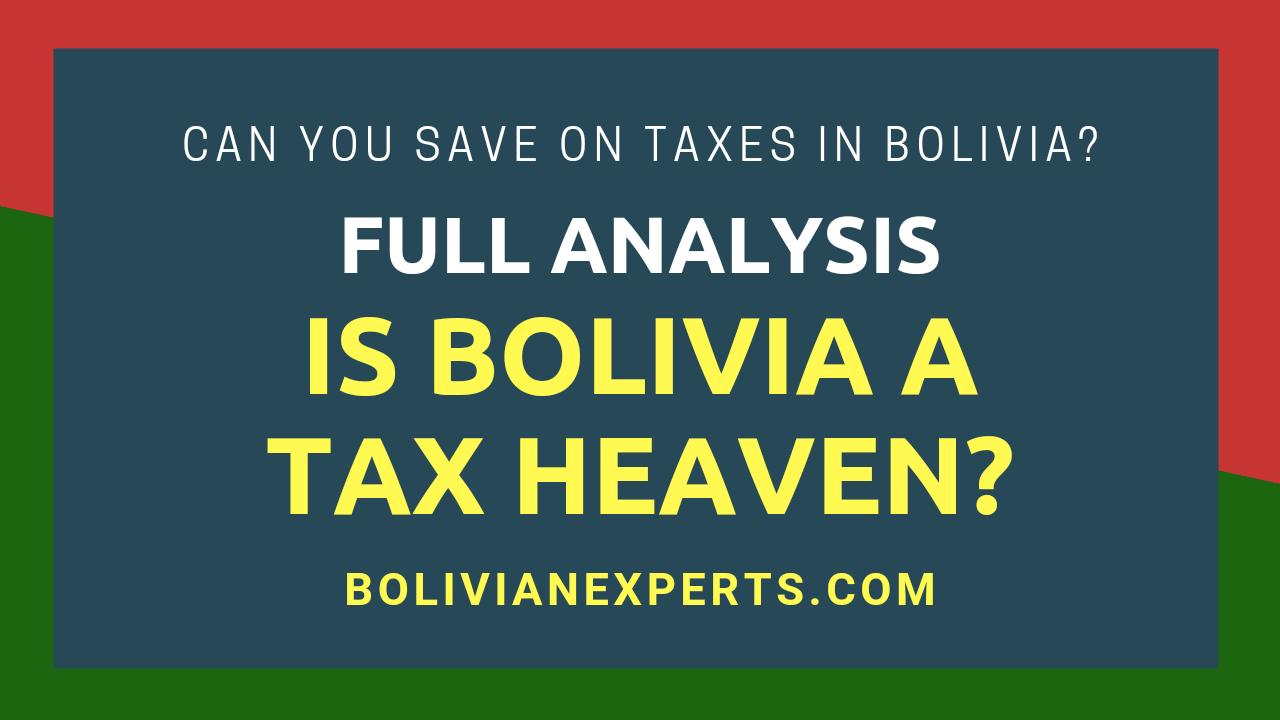As we all know, there are many tax havens and tax shelters around the world, but is Bolivia one of them? The country has some crucial taxes you need to know about, and they will apply to almost anyone, in any kind of situation, without giving too many advantages to foreigners.
In Bolivia, both individuals and firms need to pay a VAT tax of 13% over the sales price every month, and also a Corporation tax of about 25% every year, and it’s the same for any foreign person and firm. In Bolivia, you won’t pay less than 20% in taxes on your revenue in almost all situations.
Here we’ll discuss whether Bolivia is or is not a tax haven or tax shelter. You’ll learn about the principal taxes that usually businesses and individuals need to pay every month or every year regarding their commercial activities in the country, along with other details and numbers.
Is Bolivia about to become a tax haven?
From the details below, you’ll see that Bolivia is very far from becoming a tax haven or a tax shelter. The reason is that almost all individuals and businesses need to pay taxes, usually over 15% of their net income, and in many cases up to 20% or 25%. Furthermore, they need to pay a VAT tax (called IVA) of 13% over the selling price of almost any good or service they sell.
1) Lower tax rates
Personal taxes
People with low incomes in Bolivia are usually exempt from paying significant taxes regarding their commercial activities, but we’re talking about individuals who earn around $1,000 or less per month. Individuals who earn more than this threshold will usually have to pay:
- About 10% to %15 in taxes of their net income every year, if they’re professionals who have formal jobs.
- About 25% of their net income, if they run activities that are not related to their professions or that don’t require professional education.
These rules apply the same for people from overseas, foreigners, tourists, residents of all kinds, and Bolivian citizens. The Bolivian law doesn’t give any advantage to individuals or firms from other countries, in tax matters, they are treated the same as Bolivians.
Business taxes
On the other side, in regards to businesses, unless the business is really small, we mean it’s moving capital around $3,000 to $5,000 per month, or is getting a gross yearly income of around $15,000 to $20,000, it will have to pay the Corporation tax (called IUE) that all firms usually must pay in the country.
These tiny businesses also need to be operating in certain types of industries: food, crafts, or very small retail activities, to be exempt from paying the IUE tax.
Then, for example, if a business:
- Receives a gross income of only $10,000 through the year while being a business in the food space, from which $3,000 is its revenue, then in this case, it’ll only need to pay about $50 in income taxes (exempt from the IUE).
- Receives a gross income of about $30,000 a year, from which $5,000 is its revenue, then it’ll have to pay the full Corporation tax of 25% of this revenue, which is $1,250.
- Receive a gross income of about $1 million the whole year and from this, $100,000 is its revenue, it doesn’t matter which field this business is in, it’ll need to pay a Corporation tax of $25,000 in income taxes at the end of the year.
So, the only way to avoid paying business income taxes in Bolivia is to be very small and also operate in the food, crafts, or small commerce fields tax to only be charged a few 10s or 100s of dollars for any possible income from the business.
Otherwise, it’ll need to pay 25% of its yearly net income in all cases, no matter whether it’s a Bolivian or foreign company or individual.
2) Privacy for the company owner
There is also another situation that we need to take into account regarding the privacy a company can have in its finances in Bolivia.
In general, in Bolivia, it’s stated by law that any income that any bank would register that is over $10,000 needs to have a sworn declaration attached to it. So, if you have large financial or business operations within the country, the government and banks have the right to investigate what’s really happening within your finances.
Although this investigation most of the time is not performed by banking and financial entities, they certainly do it with some suspicious companies or companies they think are worth investigating.
3) Fewer procedures
Here in Bolivia, you’ll find that it’s relatively easy to create a company once you become a resident of some kind (not just a tourist), but that the process of paying taxes is more difficult, and you need to follow more steps. This process is not as easy as in developed countries.
4) More accessibility to deductions
As we just said before, in Bolivia, both locals and foreigners are treated equally by law. Bolivia’s Constitution states that foreigners and Bolivians are equal in the eyes of the law system and regulations. Once you get your foreigner’s ID card, you are subject to the same tax and law regulations any other Bolivian may have within the country.
This means that you can’t enjoy any kind of tax advantage because of the only reason you’re from another country. Also, if your company is founded here in Bolivia, it’ll be treated as a Bolivian legal person with all the taxes attached to it. If your company is from overseas and is settled in Bolivia, you’ll equally need to pay all the taxes mentioned before, there are no real tax advantages.
5) The tax rates and tax system
The income business tax and the VAT tax in Bolivia (IVA) are not the only taxes you’ll have to pay if you are operating within the country. There are other applicable taxes, we list all of them here:
- The individual’s income tax (IUE) (~5% to 20% of net income depending on the size of the activities) or business income tax (IUE) (always 25% of the net income, unless it’s a tiny business, in which case a few hundred dollars will be paid).
- The equivalent of the VAT tax (IVA) in Bolivia, which is 13% of the sales price of the good or service, paid in all cases, except for education, craft, arts, or small commerce.
- The transactions tax IT, which is paid on every transaction that is done within the country, it’s 3% of the total purchase amount.
- The financial transactions tax ITF, which is paid over every financial transaction that is done within the banking system, it’s 0.005% of the total amount of the transaction.
- The rich people’s tax, any individual who has assets of $4.3 million or more needs to pay this additional yearly tax of 1.4% to 2.4% over the total assets. So, if you own a company here or some kind of assets that together reach this level, you’ll need to pay this tax also.
- Additional contributions for employers, like medical care, retirement funds, dismissal settlements, and other similar ones. While performing your day-to-day operations, you’ll also need to pay these contributions to employees, and they normally reach about 40% of the employee’s nominal salary.
So, at the end of the day, either as a company or individual large enough in Bolivia, you’ll have to pay, putting together all the taxes mentioned before (it’s a general estimation and may differ significantly), about 25% to 40% over your gross income.
This means that if, for example, you have received from your clients during a year $100,000 from the sales you sold during that time, then you’ll need to pay about $20,000 to $30,000 just in taxes in Bolivia.
Other important nuances of Bolivia’s tax policy for foreign companies
Now let’s see some important nuances about how companies are treated by Bolivian laws and by the Bolivian tax system. As we said before, both Bolivian and foreign companies or individuals doing operations in Bolivia are treated the same by the country’s law.
Source principle in Bolivia
In Bolivia the source principle is applied, this means that any kind of commercial activity that brings revenue to a company will be taxed according to where it has been made or conducted.
Then, any kind of industrial or commercial activity that has been done within the frontiers of Bolivia is subject to all the taxes the Bolivian law dictates, as we mentioned before.
On the other hand, if the business activity has been done outside the country’s territory, it’s not subject to Bolivia’s taxes.
Double taxation in Bolivia
Bolivia also has some conventions with other countries, most of them in South America, in order to easily eliminate the double taxation trouble that may exist among companies or individuals from these countries.
However, there is not any specific double taxation convention between Bolivia and the US or Canada. So, in order to avoid this possibility, you’ll have to do more paperwork, getting more trouble when trying to avoid it.
In addition to this, many European countries have specific double taxation conventions already celebrated with Bolivia.
Is Bolivia more convenient for tax regulations?
Currently, we see that the tax system in Bolivia hasn’t almost changed. The same laws have been applied since decades ago and nowadays they’re roughly de same.
Then, in the future, we here expect that no matter what kind of government runs the country, the tax system and its regulations for both Bolivians and foreigners are not going to change significantly.
Also, you need to understand that the tax institutions and tax system of Bolivia are usually very bureaucratic and run over old systems that are difficult to handle for both individuals and corporations. It’s actually difficult to pay taxes in the country.
Offshore and shell companies in Bolivia
If you want to move your international and commercial activities to a Bolivian company, it’s legally possible to do so, as opening a company as a tourist in Bolivia is possible. But in most cases, it’s a lot better for you to be a resident of Bolivia, rather than just a tourist, in order to open a company here.
Once your company has been founded within the country, you’ll be subject to the same tax regulations as any other Bolivian company, and you’ll need to pay the appropriate taxes for your activities.
We talk in detail about the process of opening a company in Bolivia as a foreigner, with all the requirements and steps needed, in the next guide: How to open a company in Bolivia? all you need to know. Link
As for shell companies in Bolivia, creating a firm within the country is not very difficult, but when banks realize that the owner is a foreigner, they’ll take more precautions when opening bank accounts for these companies. Also, if you make transactions over $10,000, it’ll be suspicious to the banking system and they’ll in many cases investigate the finances and operations behind the business.
Conclusions:
In this note about whether Bolivia is or not a tax haven, you have seen that the country is currently very far from falling into this category. With taxes that don’t differentiate between locals and foreigners, and reaching levels of 15% to 40% of the gross income in almost all cases, it’s difficult to call Bolivia a tax haven unless you are a tiny business.
You’ve seen that in Bolivia you pay taxes by the source principle, it doesn’t matter whether you are either a Bolivian or foreign company or individual. If your industrial or commercial activities have been created and run within the country, then you’ll have to pay several types of taxes.
These taxes are the VAT tax (IVA), 13% for the sales price, the business or individual income tax (IUE), from 15% to 25% of the year’s net profits, the IT tax, 3% of any transaction done, ITF, 0.005% of any financial transaction, the rich people’s tax, for assets over 4.3 million dollars, and additional contributions for employees and firing fees.
We hope this information has helped you, and if you want to know more about all the taxes applied to Bolivian companies and commercial activities, their regulations, tax rates, ways to pay, etcetera, visit our educated guide: The business taxes in Bolivia, a complete walkthrough. Link
BolivianExperts.com, information about how to live, work, invest, and travel in Bolivia.








